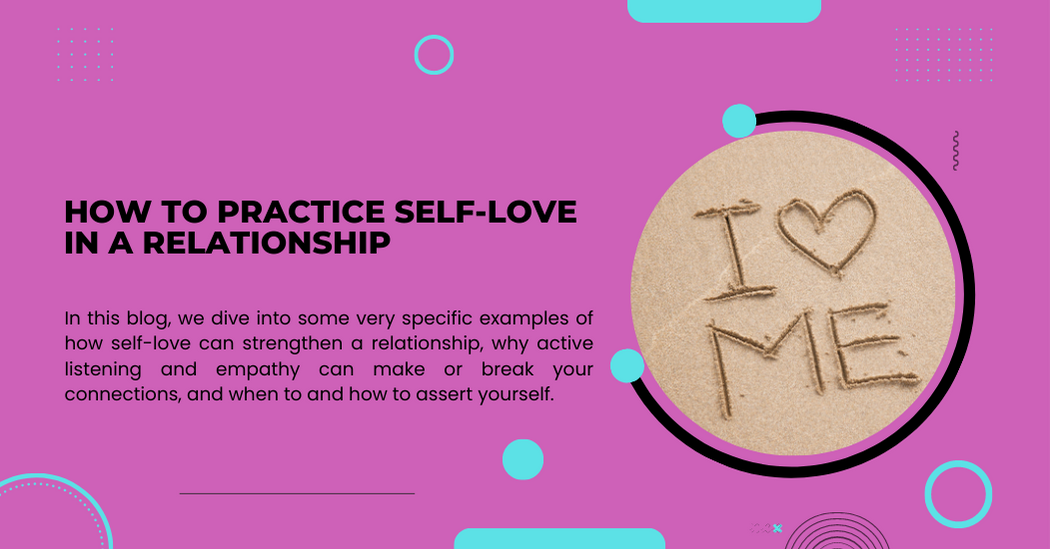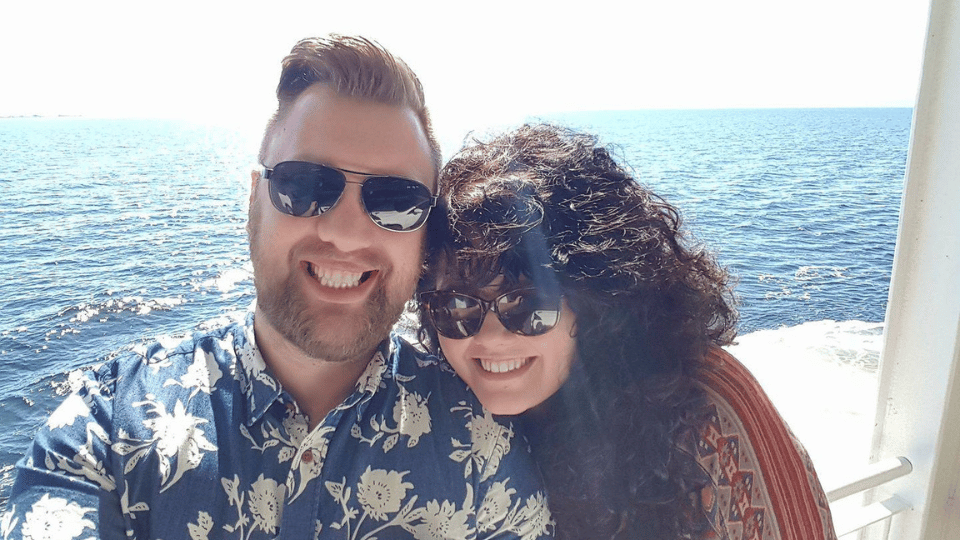Table of Contents
If you have the ability to love, love yourself first. – Charles Bukowski
RuPaul’s drag race can teach you everything you need to know about self-love and it’s relationship to everything around you.
I have to admit, I didn’t start watching it until the pandemic hit.
There wasn’t much else do to at the end of the workday, so binge-watching became a way to throw myself into something and forget all the craziness out in the world. Plus, my wife absolutely loved it, so how could I argue?
Don’t get me wrong, I listened to audiobooks as well, and in fact, it was right around this time that I really started getting into Mel Robbins who, next to my therapist, has helped to awaken a real sense of who I am and what I want out of life.
I remember watching the first episode of RuPaul, I honestly can’t remember which season it was.
He ends all his shows with the same line “If you don’t love yourself, how in the hell are you gonna love somebody else? Can I get an amen up in here?”
Amen indeed.
I came to really appreciate RuPaul’s drag race because what it really spoke to for me was the internal struggle, we all face to be who we really are.
Many drag performers described feeling like their drag personality was their real self, shining brightly and brilliantly.
But it was the line that struck me the most from the first time I heard it.
Honestly, it hit me really, hard.
I remember going to bed that night thinking to myself “Do I love myself? Am I capable of loving myself?”
I asked myself these questions because, I realize now, I had spent 22 years of my life chasing acceptance and validation from strangers.
I was trying to win friends by selling myself off as a tool to be used. It didn’t matter if I felt discarded or worthless, because in the end, people would like me and that alone would mean I was valuable.
Love, for me, was entirely external and weighed by how valuable I thought I was to others.
It was until I felt abandoned by everyone, I had worked so hard to cultivate acceptance that I realized something my wife had been telling me for most of our last 19 years together: “Other people will inevitably disappoint you, so you have to love yourself first and stop expecting others to validate you.”
In this blog post, I’m going to discuss the importance of self-love, highlight the connection between self-love and strong relationships, how to cultivate self-love, and provide 5 ways to start building a practice of self-love in your everyday life.
Top 5 ways to self-love a practice for your relationship
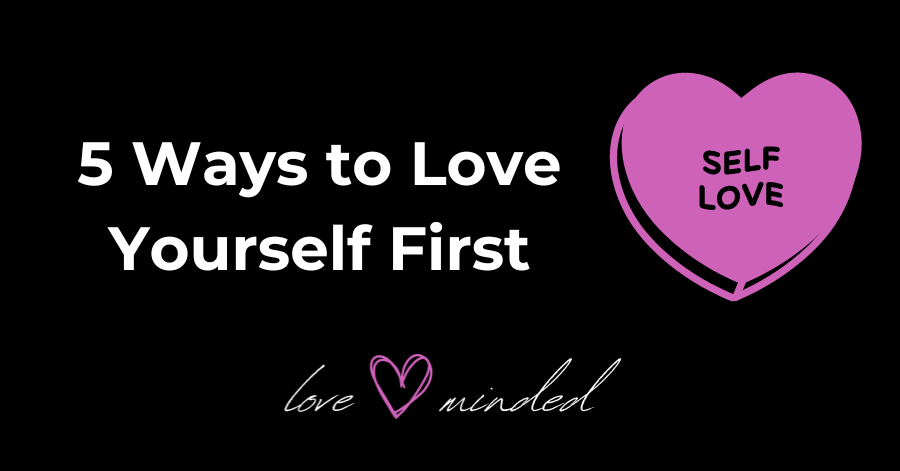
Let’s summarize some of the key ways we’ve discussed loving yourself first, and how you can start developing a practice of self-love today:
1. Prioritize self-care: Make time for activities that nurture your physical, mental, and emotional well-being.
Get out and go for a walk.
Do a crossword puzzle (or even do one together).
Practice yoga together (Steph and I did couples yoga and I was horrible at it).
Whatever it might be, spend time first exploring the ways that you feel nourished and can realize fulfillment. Then share she’s with your partner and figure out ways you can do them together (if you want) or find a way to do so alone (creating a healthy boundary).
2. Practice self-reflection: Cultivate self-awareness to understand your needs, desires, and boundaries better.
Journal, journal, journal.
At least once a day, either in the morning or at night, take 20 minutes and write in a journal.
Whether it’s day or night, do a brain dump of your day and then detail what your tasks are for the next day.
Whenever you do it, take 20 minutes to dump all your tasks, worries, hopes, dreams, fears, or whatever onto the page.
If you’re artistic (I’m not) you could even doodle how you’re feeling.
The main theme here is to get everything out of your head and onto the page. This very physical process allows you to reflect while you write and you may come up with some new ideas, concepts for projects, or at the very least just feel better without all that clutter crowding your brain.
3. Embrace self-compassion: Be kind to yourself and practice forgiveness for any perceived shortcomings.
If I haven’t said it enough in this blog post, let me say it here: you’re perfect as you are right now!
We all go through so much daily, with some many things pulling at our attention and demanding our focus, that we can forget how much we’ve gone through to be here today.
Be kind to yourself.
You are the only YOU you have. Treat yourself the way you’d treat a baby bird that you just found dazed after hitting a window. Be gentle, offer grace and a delicate touch, and encourage yourself forward.
Eventually, you’ll fly.
4. Pursue personal growth: Set and pursue individual goals that align with your values and passions.
You have goals, dreams, and passions.
Even if you haven’t discovered them yet, or even if you don’t know what your purpose is in life, you will.
I’m 38 years old and I’m still trying to find mine.
Mel Robbins didn’t do a complete huge 180 in her life until 54 years old when she finally started her podcast and 8 months in has one of the most listened to and watched podcasts on the planet!
You’re never too late to figure out where your path is.
The only way you’ll miss it is if you stop trying to find it.
Be brave, be bold, try different things and you’ll eventually find that thing you’re meant for. Then, you can enjoy it with your partner and embrace a wonderful life together.
5. Be authentic: Embrace your true self and communicate openly and honestly in your relationships.
There is only one you, so don’t pretend to be someone else.
Embrace what makes you unique, different, and special.
I’ve got a secret: everyone knows when someone is being inauthentic.
Don’t waste your time pretending to be something someone else wants, or what you think someone else wants, or what you think you need to be to make an impression.
Be you.
Boldly, unafraid, powerful you.
You’ll find that when you embrace who you authentically are, being in a loving relationship becomes so much easier.
You’re not fighting against yourself while trying to fool the other person.
You communicate what you want, what you need, and how you want to be treated.
The self-love and self-confidence will shine through, and you will feel the power of being who you are and were always meant to be.
What is self-love
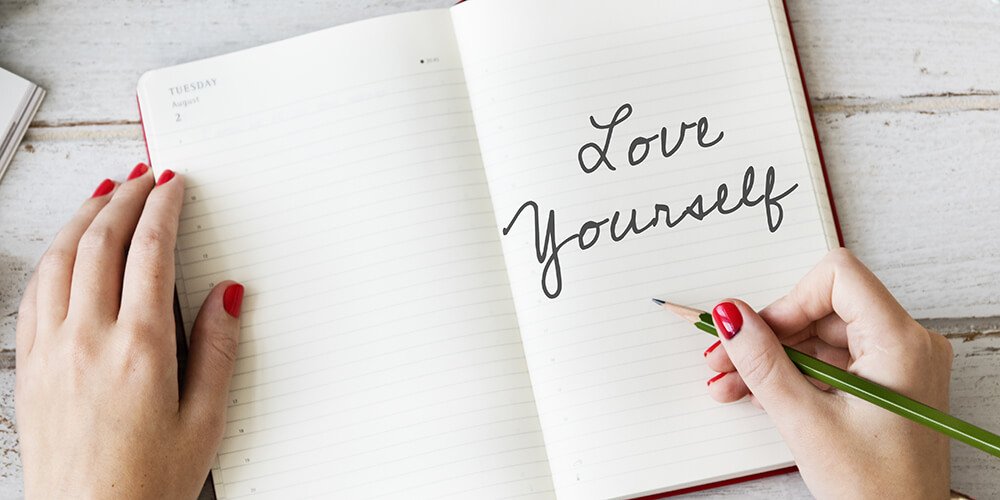
This definition of self-love is pretty simple, but it’s also bang on: self-love means that you accept yourself fully, treat yourself with kindness and respect, and nurture your growth and well-being.
I would take this definition a few steps further.
Self-love also means being able to resist the pressures of putting other people’s needs before your own, prioritizing what really matters to you, and walking in the world confident that you know who you are.
You see, self-love at its core is giving a shit ABOUT yourself.
It’s about being able to build up your inner core, your inner strength, and your capacity to withstand all the horrible and awful stuff that will come at you in life.
Not to be a downer, but life can really kick the crap out of us.
If we have a strong center, build around a rock-hard belief in our own innate self-love, care, and compassion for who we are, we can withstand a hell of a beating and keep on going.
And this isn’t selfish either.
I say this because it was the first thing I said to my therapist when we talked about me getting more in tune with what we called “my coach”, “my passenger”, and “little Ryan” (more on these in another blog post).
Essentially, these were the parts of me that were constantly causing anxiety, fear, doubt, depression, anger, frustration, and hopelessness.
I asked my therapist “Isn’t all this focus on myself incredibly selfish? There are people in the world starving, hungry, facing war and disease and here I am getting all internally focused on my own problems with myself. Isn’t this just me being really selfish?”
My therapist was great, taking all this self-criticism in stride (she’s a trooper).
She said “Ryan, it’s not selfish to want to learn about how to walk in the world with confidence and to be who you are or make it possible to discover who you are. Besides, when you do this, and you become settled and confident, you help those around you as well. You can’t help them though if you don’t help yourself.”
How right she was.
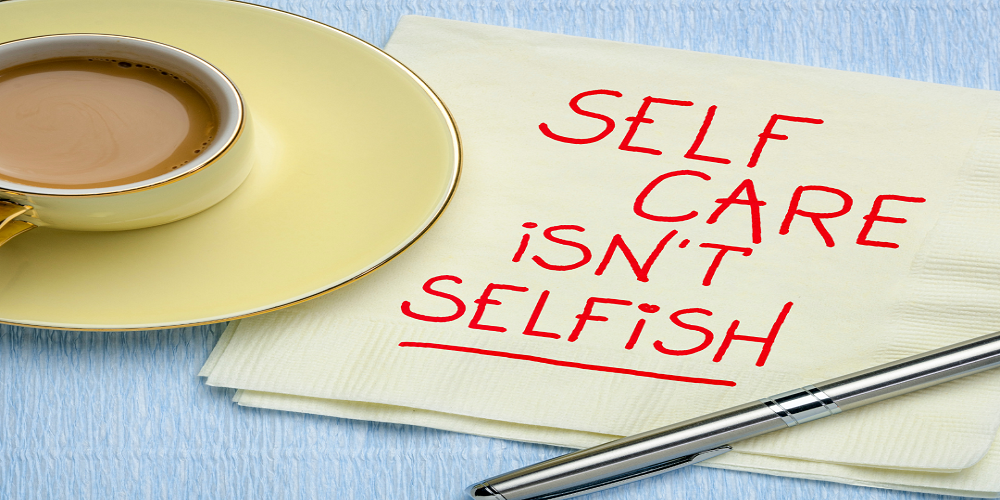
After years of burning myself out trying to please other people, I was miserable, hated virtually everything about my life, and for the first time since I was 22 started strongly contemplating suicide (I nearly attempted when I was 22, but fortunately was saved by my wife. Thus started a long journey).
I didn’t love myself; I didn’t believe in myself; I didn’t nurture and care or tend to the self-love that would have made me see the road I was taking was not authentic to who I was.
It was a life of pleasing others, and I was done with it.
Understanding self-love and its impact on relationships
More importantly, I wasn’t truly capable of loving Stephanie properly because I was constantly trying to please everyone else, even if it made me miserable.
I think Steph got this from a very early point in our relationship because whenever I push off decision-making into her or act in ways that I thought would validate a perception of what she wanted, she would push back.
She was having none of it.
She wanted me to be me, even if it meant disagreeing with her or wanting to pursue or do something that she didn’t immediately agree with.
It took me a long time to learn that this is healthy in relationships, but I can safely say the one place in my life where I’ve felt like myself has been my relationship.
This is because Steph understood better than I did that I had this tendency to please and she knew that if she fed that, it would breed resentment down the road.
What I needed to do was take the self-love that Steph showed me how to experience in our relationship and bring it to the rest of my life.
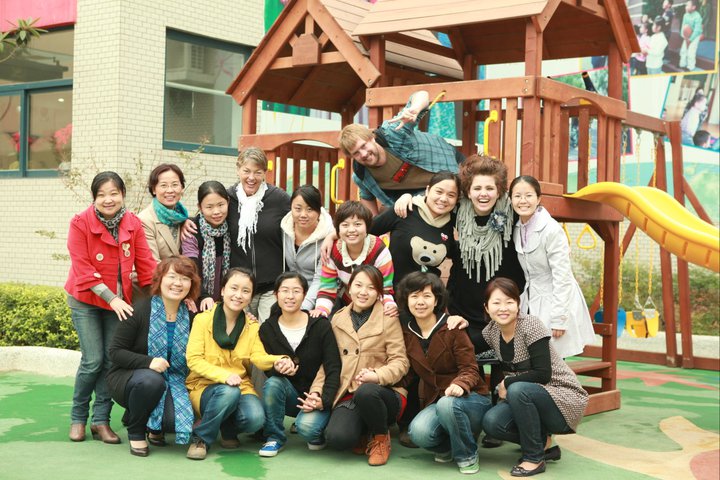
Why is self-love so important in a relationship?
If you’ve ever wondered what a lack of self-love looks like, here’s a good example.
Person 1: Is everything okay?
Person 2: Yeah, why?
Person 1: I just feel like something wrong. Are you mad at me?
Person 2: No, I’m totally fine.
Person 1: I feel you’re mad at me or that I’ve done something wrong. What did I do?
Person 2: I said nothing is wrong.
Person 1: You can tell me what I did wrong.
Person 2: FOR FUCK’S SAKE, NOTHING IS WRONG!
This is a very real scenario that happens in a lot of relationships, and it usually comes from someone deeply self-critical and lacking in self-confidence and self-love.
This kind of thing is annoying and shows a distinct lack of trust and security in your partner.
There may be many reasons for having these thoughts and feelings, none of which likely have anything to do with your partner.
This kind of negativity can cause a relationship to deteriorate quickly because where there is a lack of trust, there is a lack of reliability and where there is a lack of reliability, there’s a lack of faith in the other person.
Relationships have a hard time coming back from these kinds of deficits.
The other thing about self-love is it allows you to see yourself as your partner sees you.
Steph cares about me deeply and never hesitates to tell me why.
If I listen carefully and work to really sit with what she says, I can understand that she’s seeing something in my that I’m not seeing myself.
This is a good path towards developing the capacity to love yourself, accept who you are, and build self-confidence and self-compassion.

Self-love also makes your partner feel more confident and assured.
They see you being strong in yourself, who you are, and what you want and that makes it possible for them to feel like they don’t need to hold you up.
Relationships are heavy and hard work, and if one person is doing most of the lifting, it can become exhausting and lonely work.
When you display that strong, sustained self-love, it exudes confidence and stability, which shows your partner that you are there for yourself, for them, for the relationship, and for any challenges and obstacles that might come your way.
Most importantly, nobody, NOBODY, is ever going to make you as happy as you make yourself.
Think about it!
If you get into a relationship to be loved or to get something that you feel you’re not getting elsewhere, and that person does something that makes you feel unloved, you have not only set that person up to fail but the relationship as well.
You cannot give over your responsibility to love yourself to your partner.
It’s a recipe for disappointment and disaster.
At some point, the person you are in a relationship with will let you down or won’t love you the way you need or will disappoint you, you’ll blame them having expected them to fix you.
You’ll resent them for not doing what they never could have succeeded in.
No person can fix you or make you happy if you don’t feel loved or happy yourself.
The building blocks of any relationship are self-love, self-confidence, appreciating and caring for you as you are and trying to build the person you want to be.
Nobody can do this for you.
Define self-love and elaborate on its various aspects, including self-acceptance and self-compassion.
Explore how a lack of self-love can manifest in relationships and hinder personal growth.
Cultivating self-love for a healthier relationship
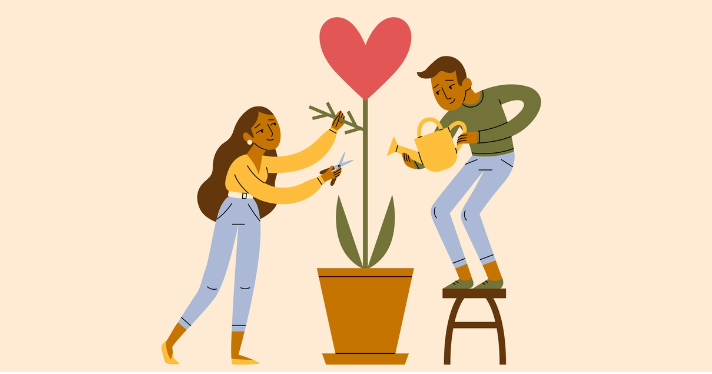
Ok, we’ve talked all about why self-love is so important, what it is, and how it impacts our most intimate relationships.
Now, let’s dive deep into how to cultivate self-love for a healthier relationship.
The first step is to practice self-care and prioritize your needs.
This sounds easier than it looks, especially if you’re in the habit of being a people pleasure and you have been pushing off your needs and wants to avoid conflict.
It’s important to understand though that looking after yourself in a relationship necessitates putting yourself and your needs first.
That means being willing to have an argument or disagreement, respectfully, when something truly doesn’t align with you.
A good example came from me over the weekend.
On Sunday I had a whole bunch of errands to run.
One of them was picking up a new wheelbarrow at Canadian Tire (we’re planning a new flower garden in the front yard, a good way to get rid of some of the giant carpet of dead grass).
I won’t bore you with the details, but after getting to the customer service counter to request help to take a wheelbarrow down off a high shelf, I waited for over an hour to get that wheelbarrow into my car and home.
This stopped five on a six-stop errand run, the next being getting some necessities from the grocery store.
They didn’t have a large bacon-free Caesar salad for Steph, so I picked up two smaller ones. I sent her a photo of them, and she approved.
When I got home and she saw the two small salad bowls, she immediately looked upset. “They’re so small,” she said. “I thought they were bigger.”
Immediately I went into overthinking, anxiety, and panic mode.
READ MY POST ON HOW TO QUIET YOUR MIND AND STOP OVERTHINKING
I fucked up!
I didn’t communicate to her that the salads were so small, I should have made sure she knew.
But the overwhelming feeling I had was one of sadness that after being out for hours the first thing that Steph said to me when I got home was something I had done was wrong.
Usually, I would have sat on this, but since I’m practicing prioritizing my needs (in this case, the need to openly express my feelings), I told Steph exactly how her comment made me feel.
I did this gently. After all, it’s not her fault that I’ve gotten upset. It’s not anyone’s fault. It’s just something that happened.
Steph walked over to me in the kitchen, put her hand on my shoulder, and told me she loved me and wasn’t upset with me or anything I had done, just upset that the salads were smaller than she was expecting.
She then hugged me and said “Let me check the salads though. Maybe they’re fine”, and of course, they were.
The key lesson here is that I realized the importance of prioritizing my need to express myself over the impulse to be quiet just to avoid what I perceived would be conflict.
It worked out too, because it gave Steph an opportunity to clarify her feelings and what she meant, meaning I didn’t need to dive into a giant mind spiral of anxiety trying to figure out if she still loved me over some fucking salad!
Self-awareness + acceptance = self-love
Have you ever heard of Acceptance and Commitment Therapy (ACT)?
In essence, it’s a practice of noticing when you have strong feelings and accepting them, embracing that those feelings are a part of yourself, and setting yourself as the center around which the feelings are happening.
It differs from Cognitive Behaviour Therapy (CBT) because CBT focuses on control.
I’m not very good at control!
When you look up Mercurial in the dictionary, a picture of my large, red, anxious, and angry face shows up.
I’m not an angry person, mind you, I just have very strong and instantaneous reactions driven largely by fear of disconnection and loss of love.
I’ve accepted that this is a part of me, a part of my personality and the emotional makeup that makes me the wonderfully unique person I am.
Is it always fun? Hell no!
But with the help of therapy and medication interventions, I’m learning to notice when these things happen, experience them instead of fighting them, and even adapt to them so I can course-correct them at the moment.
It takes time and patience, but bettering ourselves always does.
This is what acceptance is centered on; we’re perfect exactly as we are.
Fat, skinny, lazy, active, brilliant, a little thick (hello!), motivated, or weighed down.
You are perfectly wonderful as you are.
If you want to change, great. Change, but do so accepting that there is so much that has happened that has gotten you to where you are today.
The good and the bad, you’re here because of the experiences you’ve had, not despite them.
There’s tremendous power in that acceptance. Use it!
The interplay between self-love and communication in relationships
Most problems in a relationship, or any problem for that matter, come down to communication.
Think about the last argument you had with your spouse.
How did it start? Did it end with a resolution or did you just walk away? Did you react well and how did your spouse react to your reaction? Did you start it, or did they? Was it building or was it a moment of upset that caused the argument?
All these questions start from the route of how we communicate with each other in relationships.
These problems are solved through empathy and active listening.
Active listening and empathy are a self-love bridge

How many times have you been in a conversation, and you really weren’t listening to what the other person was saying because you were too focused on making your point or finding the right word or series of words to jump in?
This is the opposite of active listening.
Active listening is the skill of focusing entirely on what the other person is saying and doing so with the intent to learn and understand, not jump in and make a point.
We say there’s a difference between “listening” and “hearing”. Well, active listening is when you hear what the other person is saying and internalize it so you can acknowledge the importance of what the other person is saying.
Still not sure you get it.
Here’s Big Bang Theory’s Amy Farrah Fowler to provide some clarity.
Notice at the beginning of the clip how Amy is very uninterested and that results in Sheldon feeling unsafe in discussing an issue that is clearly very important to him.
Once Amy engaged in true active listening, she’s able to make Sheldon feel safe enough to fully engage her on the various intricacies of his issue, and as you see, he feels completely open to divulging the anxiety he’s in.
The clip ends with a clear demonstration of Sheldon NOT actively listening, as he had to be reminded rather forcefully to share the butter that Amy asked for about one minute earlier.
All of this shows that active listening is an important communication practice if you want to feel heard and hear someone else.
The more you can practice and showcase your active listening skills, the deeper your emotional connection will be with your partner.
Setting healthy boundaries improves self-love and builds trust
Do you have a place in your life or a thing that is very important to you, or even something that annoys you?
Is there something that your partner does that you absolutely hate?
Do you maybe not like being touched a certain way, or do you not want to be bothered when performing a certain task or maybe a morning or evening ritual?
These are all examples of ways we can set healthy boundaries in our lives.
The great thing about having a partner in your life is that they are a different person. They are someone unique, special, one of a kind!
That means that you are too.
Guess what that also means? You’re going to do stuff that stretches the bounds of your personal boundaries.
We all have them and the sooner that we understand what they are and explain what those boundaries are to our partners, the better.
A great example in my life is doing the laundry.

The laundry room in our house, a little sanctuary Steph has created, is her space.
I only ever go in there if she asks me to grab something, if I need to get a cleaning product for the kitchen, or if I’ve done the unthinkable and spilled something.
Other than that, this room is off-limits. It’s a room where Steph can go, put on a podcast, and have space for herself.
I have my office, where I’m writing this right now.
It’s a sanctuary for me with a beer fridge, my computer, a TV, and a comfy leather chair.
While I haven’t imposed any kind of “No girls allowed” policy for my office, Steph and her mom don’t go in this room unless it’s for a very specific reason.
This isn’t necessary but does give me the feeling of a space in the house that is uniquely and especially mine.
Even Sue (Steph’s mom) has her own sewing room! As you can imagine, it’s not a room I go into much at all.
These are healthy boundaries, and they are respected.
Discover what your healthy boundaries are and then be sure to sit down with your partner and exchange them and discuss ways to respect them.
Conflict Resolution with Compassion
You will have conflict.
There are no two ways around it.
When you are in a relationship with another person, conflict is bound to arrive.
If you want to have what I call love-building conflict you need to first understand how you enter into conflicts, how you want to be heard during a conflict, and what’s most important to you when the conflict ends.
Self-love when it comes to conflict means understanding how to exist the conflict in a healthy way where anyone feels heard, understood, and respected.
Ultimately, this means approaching conflicts with compassion.
It’s easier said than done.
Most of the time people end up in arguments before they even realize they have or what they are arguing about.
This is one way to start your love-building conflict: be always present around your partner so that when conflict does erupt, you realize it’s taking place and can enter it with an open heart.
Implementing an active listening strategy is one of the keys to doing this.
When we get into arguments or fights, we may find the overwhelming desire to be right.
You’ll dig in, even if you know or can sense you are wrong because you want to be right.
Relationships aren’t a chess match though. It’s a two-legged race. You run it together.
Steph has a great saying, “Would you rather be right or be happy?”
Happy wins out all the time, for both of us.
If you can notice yourself moving down the path of caring more about being right, slow down and start to engage in active listening.
You’ll find it will slow the pace of the argument and allow you to think more clearly.
This makes sure that you can both exist the argument happy, heard, understood, and respected.
Strengthening your relationship through individual growth
Relationships take work, but if you’re aligned with your partner, practice active listening, compassion, and empathy, and start to build a self-love practice, you’ll find that the true conflicts are few and far between.
I haven’t always been the easiest partner to be with, but the one thing I’ve always prided myself on was the deep respect I have for Steph and for her feelings.
We communicate we are open when we are vulnerable, and we speak to be heard and understood, not just to talk.
Once you have mastered the above techniques, you can move on to the next phase of relationship growth, which is the most inspiring, exciting, and fulfilling.
Encouraging personal goals and dreams to prioritize self-love

When you’re hearing and listening to each other, and when trust is a core foundation of your relationship, you can start sharing your goals and dreams with your partner.
My goal, for example, was to be elected and serve the public in a way that allowed me to bring change to my community.
I shared this goal with Steph very early on in our relationship and when it came true in 2018, we celebrated.
I didn’t get there myself, so it was a celebration for both of us, believe me!
It didn’t matter that the experience was one of the single most painful four years of my life.
It was something I had worked hard towards and that I wanted. Steph got to share in the highs and lows and in the end when it was over, we got to share in the learning too.
Steph has a goal of one day being a paralegal studies instructor.
I think she’ll be frigging amazing at this!
I always tell her that she’s so compassionate, really knows how to simplify concepts and is the single best person at putting together analogies that I’ve ever met.
(I’m serious about the analogies part, by the way. She should enter an international analogies contest. She’d take first prize, no contest!)
Sharing these dreams is sharing the love you have for yourself with your partner.
In sharing this, you grow your bond and your connection, and you enable your partner to support you, and as you support them.
Illustrate the significance of supporting each other’s personal goals and aspirations.
Discuss how self-love enables individuals to pursue their passions while being in a committed relationship.
Conclusion
Self-love can be very elusive if we aren’t serious about intentionally practicing ways to build our inner confidence and sense of self.
It can also be incredibly toxic to relationships as we often wind up pushing our expectations, fears, and insecurities on our loved ones.
As a key takeaway from this article, develop a self-love practice through either journaling, self-care, open communications, and love-building conflict.
Above all, understand that self-love isn’t selfish.
It’s essential to build healthy, strong, and connected relationships.
Talk to your partner today and discuss how you can engage in more compassionate and understanding communication with them, and don’t be shy about telling them exactly what you need to feel strong and empowered.

